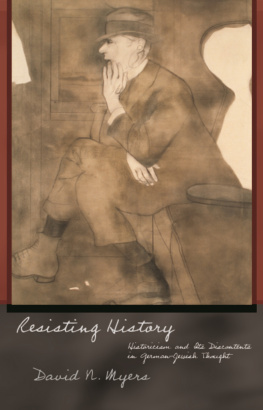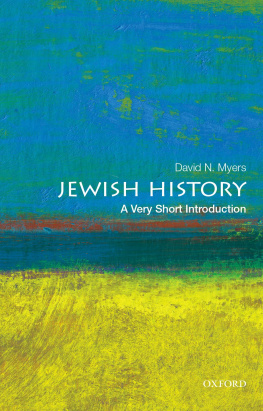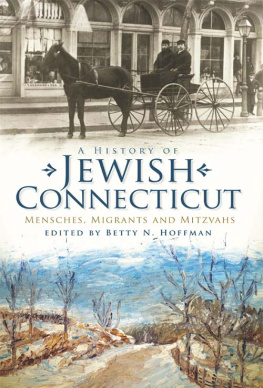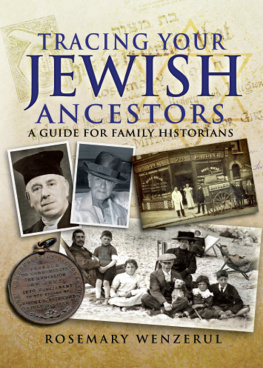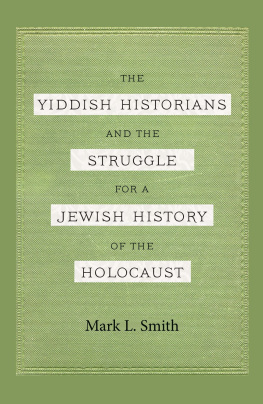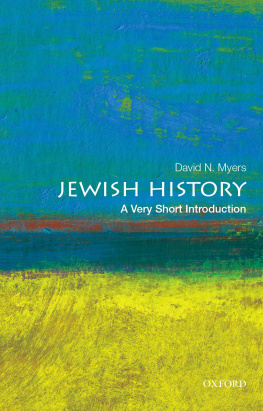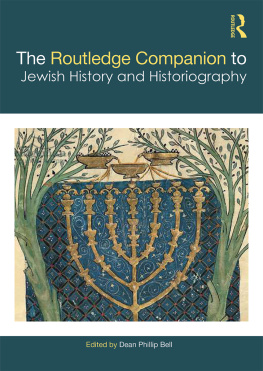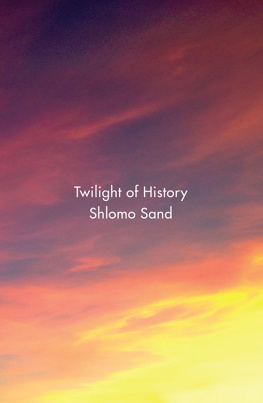The Stakes of History
The Franz Rosenzweig Lectures in Jewish Theology and History are sponsored by the Program in Judaic Studies at Yale University. The Lectures were established in 1987 by the Estate of Arthur A. Cohen and are named for theologian Franz Rosenzweig.
Other volumes in the Franz Rosenzweig Lecture series available from Yale University Press
Radical Judaism: Rethinking God and Tradition, by Arthur Green
Canon and Creativity: Modern Writing and the Authority of Scripture, by Robert Alter
German Jews: A Dual Identity, by Paul Mendes-Flohr
Freuds Moses: Judaism Terminable and Interminable, by Yosef Hayim Yerushalmi
THE STAKES OF HISTORY
On the Use and Abuse of Jewish History for Life
DAVID N. MYERS

Published with assistance from the Franz Rosenzweig Lectures in Jewish Theology and History Fund in the Program in Judaic Studies at Yale University.
Published with assistance from the foundation established in memory of Calvin Chapin of the Class of 1788, Yale College.
Copyright 2018 by Yale University.
All rights reserved.
This book may not be reproduced, in whole or in part, including illustrations, in any form (beyond that copying permitted by Sections 107 and 108 of the U.S. Copyright Law and except by reviewers for the public press), without written permission from the publishers.
Yale University Press books may be purchased in quantity for educational, business, or promotional use. For information, please e-mail sales.press@yale.edu (U.S. office) or sales@yaleup.co.uk (U.K. office).
Set in Caslon type by Integrated Publishing Solutions.
Printed in the United States of America.
Library of Congress Control Number: 2017937446
ISBN 978-0-300-22893-9 (hardcover : alk. paper)
A catalogue record for this book is available from the British Library.
This paper meets the requirements of ANSI/NISO Z39.48-1992 (Permanence of Paper).
10 9 8 7 6 5 4 3 2 1
To Sondra and Morey Myers
CONTENTS
INTRODUCTION
History, Memory, and What Lies in Between
CHAPTER 1
History as Liberation
CHAPTER 2
History as Consolation
CHAPTER 3
History as Witness
CONCLUSION
The Historian Between Remembering and Forgetting
POSTSCRIPT
A Brief Reflection on Method
PREFACE
This book began as an attempt to distill and summarize my thinking about the history of modern Jewish historiography and the role of the modern Jewish historian. I have long been interested in both the production of historical knowledge by modern scholars and the recurrent anxiety over the perceived excesses of a historicist worldview. The moment in which I started to think about this book was beset by its own anxiety, this time over the worth and meaning not only of history but of humanistic inquiry more generally in society. The combination of serious new economic pressures, institutional constraints, and declining student enrollments pushed manymyself included as a historianto rearticulate what was at stake in our work. Rather than succumb to the despair of the moment, I remained more convinced than ever that historical knowledge and perspective were necessary ingredients in understanding the world we live in and were capable of playing a constructive (though not risk free) role in the wider worldby forging memories that lend meaning to our lives, by complicating received and oversimplified historical narratives, and even by informing policy decisions.
These reflectionsand my relatively bullish view of the historians functionimmediately brought me into dialogue with one of the most important books ever written on the vocation and outlook of the Jewish historian, Yosef Hayim Yerushalmis Zakhor: Jewish History and Jewish Memory. The invitation to deliver the Rosenzweig Lectures afforded me the opportunity both to revisit a key pillar of Zakhor and to rethink, alongside Yerushalmi, the function and mission of history in the modern age. I elaborate more fully on my connection to Zakhor and Professor Yerushalmi in the Introduction and return to both frequently throughout. Suffice it to say that the present book has neither the erudition nor the lyricism of Zakhor, though it does share Yerushalmis description of that volume as part history, part confession and credo. It is my hope that through this mix of genres I can shed new light on the uses to which history has been put in the past and to which it might profitably be put in the future.
ACKNOWLEDGMENTS
This book emerged out of the invitation of the Yale University Program in Judaic Studies and Professor Steven Fraade to deliver the Franz Rosenzweig Lectures in November 2014. I would like to thank my hosts at Yale for their warm hospitality during the week I spent in New Haven to deliver the lectures: in addition to Steven Fraade, I would like to thank Renee Reed for her gracious assistance in all matters logistical, Elli Stern for his good humor and helpful provocations, and the members of the Judaic Studies community, faculty and students, at Yale. A special debt of appreciation is owed to my dear New Haven friends and interlocutors Anne Dailey, Steve Ecker, and Rabbi Jim Ponet.
Versions of this talk were delivered at the Australian Centre for Jewish Civilization of Monash University. I thank my friend Professor Mark Baker for the kind invitation and hospitality during my delightful stay in Melbourne; I also extend deep appreciation to Helen Midler for attending to every detail relating to my visit with efficiency and humor. I presented ideas related to this book in forums at the Katz Center for Advanced Judaic Studies of the University of Pennsylvania, the CUNY Graduate Center, Lehigh University, and Cardozo Law School. Thanks to Professors Steven Weitzman, Francesca Bregoli, Nitzan Lebovic, and Suzanne Last Stone for their invitations to participate in the stimulating intellectual settings they have created at their institutions. I also thank Professor Magda Teter for a most helpful critique of at a conference on history and law at Cardozo in September 2016.
Numerous colleagues read this manuscript and improved it considerably. Michael A. Meyer offered typically searching comments on an early version of the manuscriptdelivered, per his custom, in forty-eight hours. My thanks go, as well, to Sarah Abrevaya Stein, Michael Berenbaum, Saul Friedlander, David Ellenson, John Efron, Michael Brenner, Ethan Kleinberg, Nitzan Lebovic, and Nomi Stolzenberg for their careful reading. A special thanks goes to my erstwhile student and conversation partner Moshe Lapin, who pored over every page of this book with his sharp eye and wide-ranging knowledge. For invaluable research assistance, I thank Lindsay King, Joshua Meyers, and Talia Graff. Nadav Molchadsky offered very helpful criticism and assistance at early and late stages of the project.
Yale University Press has been a most hospitable home for this book. My thanks go to Jennifer Banks, the Presss editor who oversees publication of the Rosenzweig Lectures series, for her interest, attention, and encouragement. Susan Laity undertook the copyediting of this book with a meticulousness, intelligence, and care that know few peers.
I would like to express my appreciation to Lori and Jim Keir for their friendship and support, as well as to the Sady and Ludwig Kahn Chair in Jewish History which facilitated my work on this project.
Finally, this book is dedicated to my parents, Sondra and Morey Myers, who have avidly followed and encouraged me throughout my career, including in New Haven, to which they dutifully came for the Rosenzweig Lectures. For them, thinking and doing are the necessary and sufficient conditions of a well-lived life. Individually and together, they have modeled the fusing of these two domains in exemplary fashion. I thank them for their ceaseless support, love, and inspiration.
Next page

